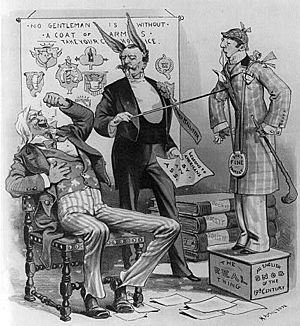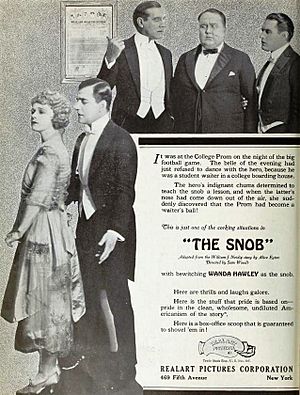Snob facts for kids

Snob is a pejorative term for a person who believes there is a correlation between social status (including physical appearance) and human worth. Snob also refers to a person who feels superiority over those from lower social classes, education levels, or other social areas. The word snobbery came into use for the first time in England during the 1820s.
Contents
Examples
Snobs can through time be found ingratiating themselves with a range of prominent groups – soldiers (Sparta, 400 BCE), bishops (Rome, 1500), poets (Weimar, 1815) – for the primary interests of snobs is distinction, and as its definition changes, so, naturally and immediately, will the objects of the snob's admiration.
Snobbery existed also in mediaeval feudal aristocratic Europe, when the clothing, manners, language and tastes of every class were strictly codified by customs or law. Geoffrey Chaucer, a poet moving in the court circles, noted the provincial French spoken by the Prioress among the Canterbury pilgrims:
And French she spoke full fair and fetisly
After the school of Stratford atte Bowe,
For French of Paris was to her unknowe.
William Rothwell notes "the simplistic contrast between the 'pure' French of Paris and her 'defective' French of Stratford atte Bowe that would invite disparagement".
Snobbery surfaced more strongly as the structure of the society changed, and the bourgeoisie had the possibility to imitate aristocracy. Snobbery appears when elements of culture are perceived as belonging to an aristocracy or elite, and some people (the snobs) feel that the mere adoption of the fashion and tastes of the elite or aristocracy is sufficient to include someone in the elites, upper classes or aristocracy.
Snob victim
The term "snob" is often misused when describing a "gold-tap owner", i.e. a person who insists on displaying (sometimes non-existent) wealth through conspicuous consumption of luxury goods such as clothes, jewelry, cars etc. Displaying awards or talents in a rude manner, boasting, is a form of snobbery. A popular example of a "snob victim" is the television character Hyacinth Bucket of the BBC comedy series Keeping Up Appearances.
Snobbatives
Ghil'ad Zuckermann proposes the term snobbative to refer to a pretentious, highfalutin phrase used by a person in order to sound snobbish. The term derives from snob + -ative, modelled upon comparatives and superlatives. Thus, in its narrow sense, a snobbative is a pompous (phonetic) variant of a word. Consider the following hypercorrect pronunciations in Israeli Hebrew:
- khupím is a snobbative of khofím (חופים), which means "beaches";
- tsorfát is a snobbative of tsarfát (צרפת), which refers to "France";
- amán is a snobbative of omán (אמן), which means "artist".
A non-hypercorrect example in Israeli Hebrew is filozófya, a snobbative of filosófya (פילוסופיה), which means "philosophy". The snobbative filozófya (with z) was inspired by the pronunciation of the Israeli Hebrew word פילוסופיה by German Jewish professors of philosophy, whose speech was characterized by intervocalic voicing of the s as in their German mother tongue.
See also
 In Spanish: Esnob para niños
In Spanish: Esnob para niños
- Arrogance
- Assertiveness
- Boasting, something which is higher in a hierarchical structure of any kind
- Confidence
- Chronological snobbery
- Classism
- Contempt
- Discrimination
- Egotism
- Elitism
- Emotional insecurity
- Entitlement
- Envy
- Four Yorkshiremen sketch
- Greed
- Inferiority complex
- Jealousy
- Narcissism
- Prejudice
- Prestige
- Pride
- Privilege
- Prima donna
- Queen bee
- Respectability
- Social climber
- Spoiled child
- Superiority
- Superiority complex
- Supremacy
- The Book of Snobs
- The Snob (1924 film)
- Vanity


